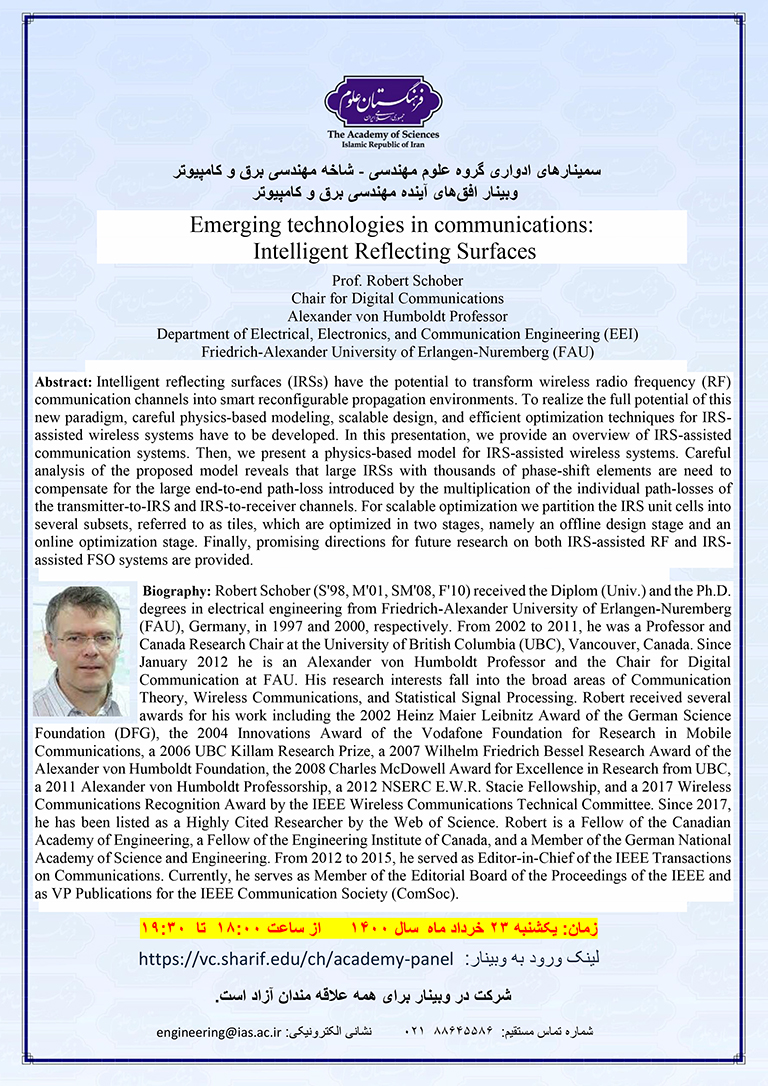
On Sunday, June 13, 2021, the Division of Electrical and Computer Engineering of the Academy held a webinar on the Future Horizons of Electrical and Computer Engineering.
In this event, Prof. Robert Schober delivered a lecture on the Emerging Technologies in Communications: Intelligent Reflecting Surfaces. Since 2012 Prof. Schober has been an Alexander von Humboldt Professor and the Chair for Digital Communications, Department of Electrical, Electronics, and Communication Engineering (EEI), Friedrich-Alexander University of Erlangen-Nuremberg (FAU).
The recorded video lecture is available in the following two links:
Prof. Schober’s lecture abstract and biography are as follows:
Abstract: Intelligent reflecting surfaces (IRSs) have the potential to transform wireless radio frequency (RF) communication channels into smart reconfigurable propagation environments. To realize the full potential of this new paradigm, careful physics-based modeling, scalable design, and efficient optimization techniques for IRS-assisted wireless systems have to be developed. In this presentation, we provide an overview of IRS-assisted communication systems. Then, we present a physics-based model for IRS-assisted wireless systems. Careful analysis of the proposed model reveals that large IRSs with thousands of phase-shift elements are need to compensate for the large end-to-end path-loss introduced by the multiplication of the individual path-losses of the transmitter-to-IRS and IRS-to-receiver channels. For scalable optimization we partition the IRS unit cells into several subsets, referred to as tiles, which are optimized in two stages, namely an offline design stage and an online optimization stage. Finally, promising directions for future research on both IRS-assisted RF and IRS-assisted FSO systems are provided.
Biography: Robert Schober (S'98, M'01, SM'08, F'10) received the Diplom (Univ.) and the Ph.D. degrees in electrical engineering from Friedrich-Alexander University of Erlangen-Nuremberg (FAU), Germany, in 1997 and 2000, respectively. From 2002 to 2011, he was a Professor and Canada Research Chair at the University of British Columbia (UBC), Vancouver, Canada. Since January 2012 he is an Alexander von Humboldt Professor and the Chair for Digital Communication at FAU. His research interests fall into the broad areas of Communication Theory, Wireless Communications, and Statistical Signal Processing. Robert received several awards for his work including the 2002 Heinz Maier Leibnitz Award of the German Science Foundation (DFG), the 2004 Innovations Award of the Vodafone Foundation for Research in Mobile Communications, a 2006 UBC Killam Research Prize, a 2007 Wilhelm Friedrich Bessel Research Award of the Alexander von Humboldt Foundation, the 2008 Charles McDowell Award for Excellence in Research from UBC, a 2011 Alexander von Humboldt Professorship, a 2012 NSERC E.W.R. Stacie Fellowship, and a 2017 Wireless Communications Recognition Award by the IEEE Wireless Communications Technical Committee. Since 2017, he has been listed as a Highly Cited Researcher by the Web of Science. Robert is a Fellow of the Canadian Academy of Engineering, a Fellow of the Engineering Institute of Canada, and a Member of the German National Academy of Science and Engineering. From 2012 to 2015, he served as Editor-in-Chief of the IEEE Transactions on Communications. Currently, he serves as Member of the Editorial Board of the Proceedings of the IEEE and as VP Publications for the IEEE Communication Society (ComSoc).